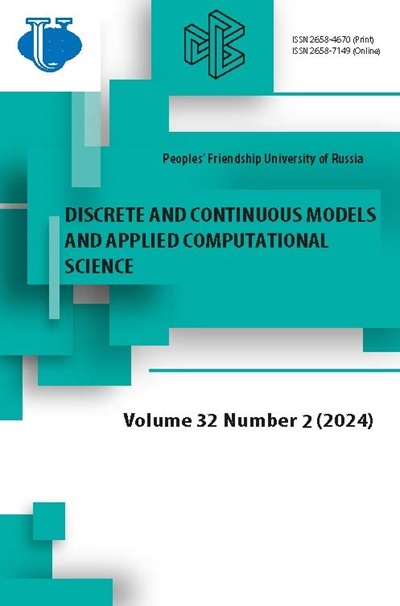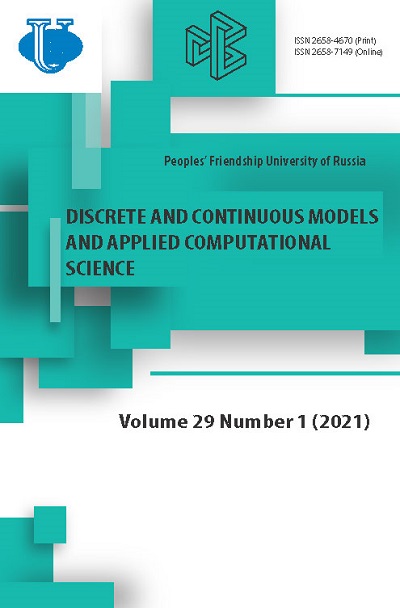Optimization of mobile device energy consumption in a fog-based mobile computing offloading mechanism
- Authors: Daraseliya A.V.1, Sopin E.S.1,2
-
Affiliations:
- Peoples’ Friendship University of Russia (RUDN University)
- Federal Research Center “Computer Science and Control” of the Russian Academy of Sciences (FRC CSC RAS)
- Issue: Vol 29, No 1 (2021)
- Pages: 53-62
- Section: Articles
- URL: https://journals.rudn.ru/miph/article/view/26140
- DOI: https://doi.org/10.22363/2658-4670-2021-29-1-53-62
Cite item
Full Text
Abstract
The offloading of computing tasks to the fog computing system is a promising approach to reduce the response time of resource-greedy real-time mobile applications. Besides the decreasing of the response time, the offloading mechanisms may reduce the energy consumption of mobile devices. In the paper, we focused on the analysis of the energy consumption of mobile devices that use fog computing infrastructure to increase the overall system performance and to improve the battery life. We consider a three-layer computing architecture, which consists of the mobile device itself, a fog node, and a remote cloud. The tasks are processed locally or offloaded according to the threshold-based offloading criterion. We have formulated an optimization problem that minimizes the energy consumption under the constraints on the average response time and the probability that the response time is lower than a certain threshold. We also provide the numerical solution to the optimization problem and discuss the numerical results.
Full Text
Introduction In recent years, fog computing has received attention from the scientific and industrial community. Many papers were related to opportunities and challenges of fog, focusing primarily on the networking context of the Internet of Things (IoT) [1]. Another one of the most popular topics and pressing research issue is the compromise between the energy-efficiency and the response time in offloading of mobile application tasks to fog computing infrastructure. The paper [2] presents the results of a study on energy consumption, execution delay and payment cost of offloading processes in a fog computing network in terms of queuing theory. Research in [3] focuses on energy-efficient task offloading, whose main idea is taking into account both energy consumption and schedule delay under fog devices. Energy efficient offloading is also a vital task in the context of the Internet of Things concept [4]. In our previous paper [5], we developed an analytical framework for response time analysis that takes into account the variation of tasks in terms of processing volume. Then in the paper [6], we analyze the two-parameter offloading mechanism that takes into account both the computing complexity and the data size to be transferred in case of offloading. In [7] we derived the cumulative distribution function of the response time in terms of Laplace- Stieltjes Transform. In the current work, we solve the optimization problem by minimizing energy efficiency, subject to the average time constraint and taking into account the probability that the time exceeds a given threshold. Mathematical model We consider a distributed computing system that consist of mobile devices (MDs), a fog node and a remote cloud. MDs run real-time applications that require significant amount of computational resources. For each task, a MD makes a decision, whether it will be offloaded to the fog node or processed locally. The capacity of the fog node is limited, which means if there are too many tasks offloaded, then some of the offloaded tasks are redirected to the remote cloud to prevent the fog node congestion. In terms of queuing theory, the considered system can be represented as shown in the figure 1. Figure 1. Mathematical model in terms of queuing network Assume there are
About the authors
Anastasia V. Daraseliya
Peoples’ Friendship University of Russia (RUDN University)
Author for correspondence.
Email: avdaraseliya@sci.pfu.edu.ru
PhD student of Department of Applied Probability and Informatics
6, Miklukho-Maklaya St., Moscow, 117198, Russian FederationEduard S. Sopin
Peoples’ Friendship University of Russia (RUDN University); Federal Research Center “Computer Science and Control” of the Russian Academy of Sciences (FRC CSC RAS)
Email: sopin-es@rudn.ru
Candidate of Physical and Mathematical Sciences, Assistant professor of Department of Applied Probability and Informatics of Peoples’ Friendship University of Russia (RUDN University); Senior Researcher of Institute of Informatics Problems of Federal Research Center “Computer Science and Control” Russian Academy of Sciences
6, Miklukho-Maklaya St., Moscow, 117198, Russian Federation; 44-2, Vavilova St., Moscow 119333, Russian FederationReferences
- M. Chiang and T. Zhang, “Fog and IoT: an overview of research opportunities,” IEEE Internet of Things Journal, vol. 3, no. 6, pp. 854-864, 2016. doi: 10.1109/JIOT.2016.2584538.
- Z. Chang, Z. Zhou, T. Ristaniemi, and Z. Niu, “Energy efficient optimization for computation offloading in fog computing system,” in GLOBECOM 2017 - 2017 IEEE Global Communications Conference, 2017, pp. 1-6. doi: 10.1109/GLOCOM.2017.8254207.
- Y. Jiang, Y. Chen, S. Yang, and C. Wu, “Energy-efficient task offloading for time-sensitive applications in fog computing,” IEEE Systems Journal, vol. 13, no. 3, pp. 2930-2941, 2019. doi: 10.1109/JSYST.2018.2877850.
- Q. Li, J. Zhao, Y. Gong, and Q. Zhang, “Energy-efficient computation offloading and resource allocation in fog computing for Internet of Everything,” China Communications, vol. 16, no. 3, pp. 32-41, 2019. doi: 10.12676/j.cc.2019.03.004.
- E. S. Sopin, A. V. Daraseliya, and L. M. Correia, “Performance analysis of the offloading scheme in a fog computing system,” in 2018 10th International Congress on Ultra Modern Telecommunications and Control Systems and Workshops (ICUMT), 2018, pp. 1-5. doi: 10.1109/ICUMT. 2018.8631245.
- E. Sopin, K. Samouylov, and S. Shorgin, “The analysis of the computation offloading scheme with two-parameter offloading criterion in fog computing,” pp. 11-20, 2019. doi: 10.1007/978-3-030-34914-1_2.
- E. Sopin, N. Zolotous, K. Ageev, and S. Shorgin, “Analysis of the response time characteristics of the fog computing enabled real-time mobile applications,” Lecture Notes in Computer Science, vol. 12525, pp. 764-779, 2020. doi: 10.1007/978-3-030-65726-0_9.
















